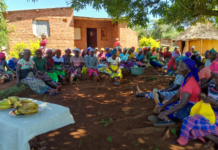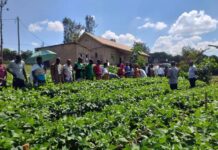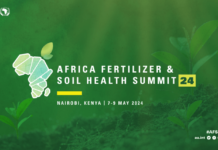The Alliance for a Green Revolution in Africa (AGRA) has launched, in Rwanda, a five-year agricultural strategy with plans to double its investment in the country to support small and medium enterprises (SMEs) to help advance Rwanda’s agriculture sector.
According to Jean Jacques Mbonigaba Muhinda, AGRA’s Regional Head, East and Southern Africa, the alliance is lucky to get partners such as USAID, Bill & Melinda Gates Foundation and Mastercard Foundation among others to support in financing, in resource mobilisation.
“We are planning actually to invest between $40 million and $50 million in the next five years in Rwanda, which is going to be more or less double compared to what we invested in the last strategy,” said Mbonigaba.
Dr. Jean Chrysostome Ngabitsinze, Rwanda’s Minister of Trade and Industry recognised the role AGRA is playing to connect the country’s agricultural sector players with needful support towards growth.
“AGRA is supporting us to reach other funders and likeminded collaborations to help access markets, better our production and have tangible products good in quality and quantity,” said Ngabitsinze during the new strategy launch in Kigali, Rwanda yesterday.
Youth and women led SMEs
In the new strategy AGRA will focus on supporting SMEs that are small, informal, and underfinanced, with a special focus on youth and women led SMEs during the current strategy period with interventions that cut through four business lines and three cross-cutting areas.
“Our strategy has built up on the sectors and there is huge potential for agriculture development. We have a growing youth and women population that has given us an opportunity in the agricultural sector and shown interest in it,” said Agnes M. Kalibata, President, AGRA.
The Rwanda AGRA Country Strategy 2023-2027 will also focus on creating employment opportunities for youth and women in the agricultural value chain.
More youths are entering Rwanda’s labor market to compete for the limited employment opportunities. Today, 60% of the employed youth are in the agricultural sector.
By transforming the agricultural sector, and growing private sector companies, more job, work and entrepreneurship opportunities emerge for young people to gain meaningful (self) employment.
As such, AGRA Rwanda is seeking to create 132,000 fulfilling and dignifying jobs for youth and women through investment and strengthening of work pathways that benefit them.
Focus areas
In this, the alliance selected four complementary and integrated business lines that include the seed systems, sustainable farming, inclusive markets & trade (IMT), and policy & state capability (PSC).
Besides the four business lines, AGRA and its partners selected three cross-cutting areas such as inclusivity (enabling women and youth to contribute to agriculture for their economic empowerment), climate change adaptation (equipping farmers and strengthening food systems to absorb and recover from shocks, and nutrition (improving nutrition outcomes by diversifying crops and ensuring food availability).
The primary business line for Rwanda for the 2023-2030 strategy is inclusive markets and trade (IMT) while being complemented by other business lines to support the country in building inclusive and competitive markets through value addition and trade.
Past achieving
According to Mbonigaba, the overall objective of the new strategy is to build on the achievements of the previous strategy, in which AGRA invested more than $20 million in the last five years since 2017.
In this strategy, the focus was mainly on building a seed system for Rwanda in terms of supporting private seed companies producing more seed, commercialising the seed, marketing the seed, and even supporting the input distribution system so that those new technologies can be accessed by farmers.
“Moving into the new strategy 2023-2027, we are going to the next level of investment and focus on strengthening the capacity of small and medium enterprises (SMEs) engaged in agribusiness, mainly in the seed production, seed processing, seed marketing, other inputs, and other technologies, and even SMEs that are involved in market activities such as processing, storing, adding value and off-taking among others.”









